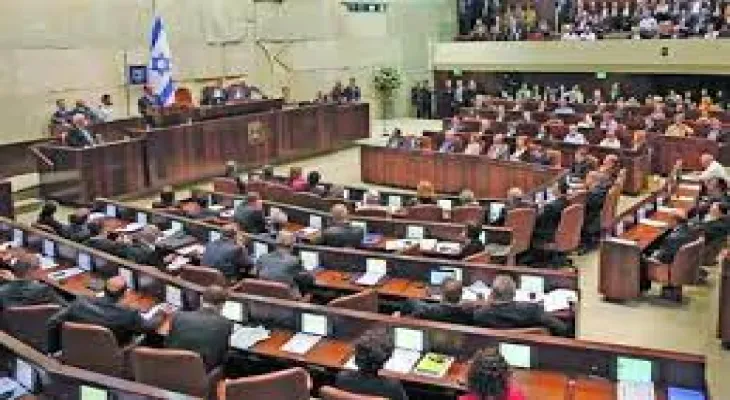Search here
Newspaper
Search here

Arab Canada News
News

Published: February 21, 2024
The Israeli Knesset today, Wednesday, approved a draft resolution submitted by Prime Minister Benjamin Netanyahu to counter what was described as "international dictates and unilateral declaration of a Palestinian state."
99 members voted in favor of the draft resolution, while 9 other members opposed it.
From the Knesset podium, Netanyahu addressed the international community, saying that the people of Israel and their representatives are more united than ever against the imposition of a Palestinian state.
He considered that these dictates will not lead to the establishment of a Palestinian state, believing that "reaching this solution comes through the destruction of Hamas and direct negotiations without preconditions," according to his description.
A statement from the Knesset said: "Israel will continue to oppose unilateral recognition of the Palestinian state. Such recognition following the October 7 massacre will give great reward to unprecedented terrorism and will prevent any peaceful settlement in the future."
The statement referred to the surprise attack by Hamas on southern Israel on October 7 of last year.
Since then, Israel has been waging an ongoing war on the Gaza Strip, which has so far led to the death of about 30,000 Palestinians, according to the Ministry of Health in the sector.
Opposition leader Yair Lapid said in his response to Netanyahu: "My party and I voted in favor of this proposal because my party and I are against unilateral measures. But as you and I well know, there is no such thing really. This is an invention. You invented a threat that does not exist. What are we talking about? There is not a single official in the world proposing unilateral recognition of Palestine. You came up with an idea so they don’t raise banners saying 'You are guilty'."
The Israeli government had unanimously approved on Sunday a decision opposing "unilateral recognition of the Palestinian state."
International and regional calls have escalated for the establishment of a Palestinian state within the framework of the two-state solution proposed by international and Arab bodies and organizations, aiming to end the Israeli-Palestinian conflict.
Last November, US Secretary of State Antony Blinken announced that the United States "has begun work to lay the foundations for the establishment of two separate states" to end the conflict in the long term, considering that "the two-state solution is the only path to peace in the Middle East."
On Monday, the European Union entered the proposal, with the EU Foreign Policy Commissioner Josep Borrell announcing that he had received a request from two European countries to discuss the recognition of a Palestinian state, without naming them.
Borrell said the EU must "support the Arab initiative" which stipulates the establishment of a Palestinian state in the West Bank and Gaza Strip.
Under continued international pressure on Israel, Netanyahu pledged to continue the war in Gaza and to carry out a planned ground operation in the border city of Rafah with Egypt at the southernmost end of the sector, where more than a million people are crowded, most of them displaced who fled their areas to escape the fighting.
Netanyahu strongly rejects the establishment of a Palestinian state, despite international pressure, especially from the US.
Meanwhile, the Palestinian Foreign Ministry condemned the Knesset decision rejecting unilateral recognition of the Palestinian state.
It considered Israel's decision a challenge to the international community, rejecting recognition of the State of Palestine and Israel's insistence on kidnapping the rights of the Palestinian people, with the Palestinian state remaining hostage to occupation and its racist interests.
The Palestinian Foreign Ministry confirmed that Palestine's right to full membership in the United Nations and recognition by countries does not require Netanyahu’s permission, and called on the international community to impose this under international law to protect the two-state solution and ensure the success of any future negotiations.
Comments